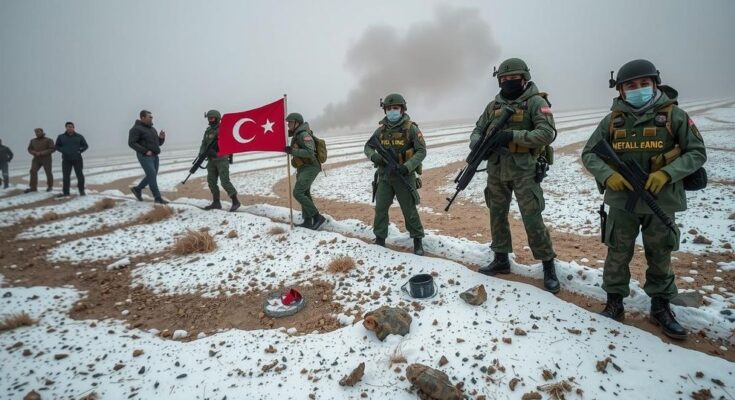U.S. officials have announced an extension of the cease-fire in the Syrian city of Manbij, aimed at facilitating negotiations between Kurdish and Turkish-backed forces. This extension follows the recent agreement that requires Kurdish withdrawal to reduce tensions in the region. General Mazloum Abdi has proposed a demilitarized zone in Kobani, reflecting efforts to address security concerns while navigating complex historical conflicts involving the Turkish government and Kurdish groups.
The cease-fire in Manbij, a critical city in northern Syria, has been extended for a few more days as U.S. and foreign officials engage in efforts to secure a lasting peace between Kurdish and Turkish-backed forces. As articulated by Matthew Miller, a spokesperson for the State Department, this temporary cessation of hostilities is designed to allow for further negotiations aimed at reducing tensions in a region that remains volatile following years of conflict. Manbij has historically been a contested area, witnessing various factions vie for control and has previously been under the influence of the Islamic State.
The latest cease-fire, initiated on December 10, compelled Kurdish forces to withdraw from Manbij and relocate to the eastern bank of the Euphrates River, a boundary established in a prior agreement brokered by the Trump administration. This maneuver is anticipated to alleviate the strain between the Kurdish forces and the Turkish-backed Syrian National Army. However, Turkey views the Kurdish militias as a direct threat due to their association with the Kurdistan Workers’ Party, a group that has long clashed with the Turkish government.
As the cease-fire continues, General Mazloum Abdi, the Kurdish military commander, has expressed willingness to establish a demilitarized zone in Kobani, with American oversight, suggesting a proactive approach to assuage Turkey’s security concerns. The U.S. administration, under President Biden, is purportedly exploring channels of communication with Turkey to address the complexities arising in northern Syria, though the pathway remains fraught with complications given the entrenched hostilities in the region.
The ongoing conflict in northern Syria has deeply involved various factions, prominently the Kurdish forces and Turkish-backed groups, particularly in areas like Manbij, which have served as both strategic and symbolic battlegrounds. The Turkish government perceives the Kurdish groups as terror threats aligned with the PKK, exacerbating the tensions within the region. The United States, with a vested interest in combating the remnants of the Islamic State, has previously allied with the Kurds, complicating the geopolitical landscape as it seeks to mediate between conflicting parties while ensuring that Turkey’s security concerns are addressed. Historically, the U.S. has relied on the Syrian Democratic Forces to counter extremist elements, yet as Turkey remains an important NATO ally, the delicate balance of U.S. foreign policy in the area continues to be tested. The city of Kobani, regained from ISIS by Kurdish fighters, represents not only a strategic point but also a poignant symbol of Kurdish resilience, making the attempts to create a demilitarized zone particularly significant against the backdrop of these historical tensions.
In summary, the extension of the cease-fire in Manbij presents a crucial opportunity for dialogue and tension reduction between Kurdish forces and Turkish-backed fighters. With U.S. officials facilitating discussions and proposing the establishment of a demilitarized zone in Kobani, the potential for a more stable and peaceful resolution in northern Syria could emerge. However, the complexities arising from Turkey’s concerns about the Kurdish militias necessitate careful navigational strategies from American diplomacy. The situation remains precarious, requiring sustained international engagement to foster long-term stability in the region.
Original Source: www.nytimes.com




